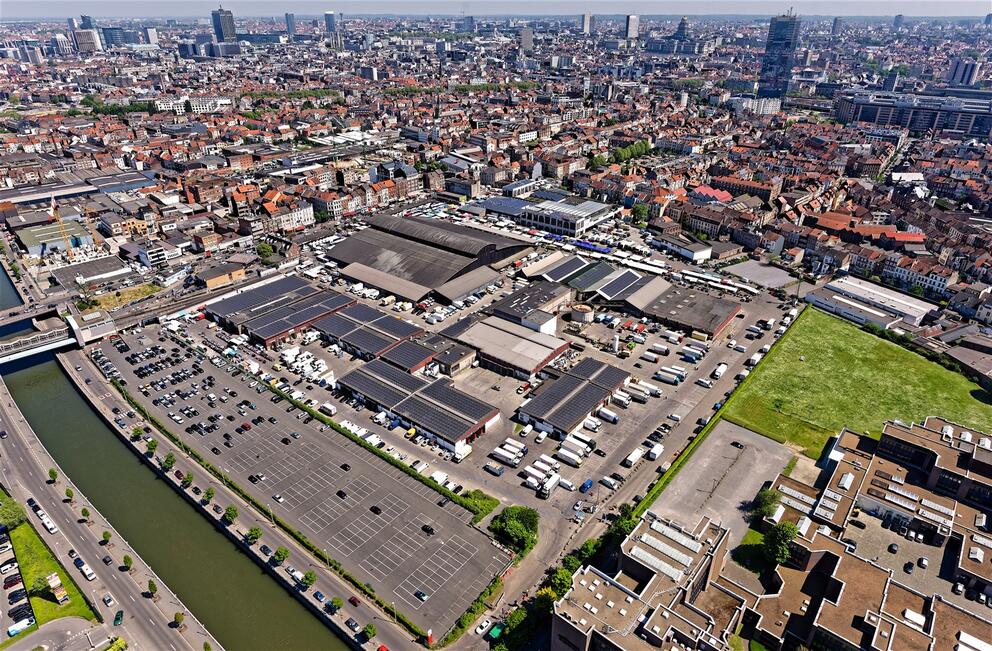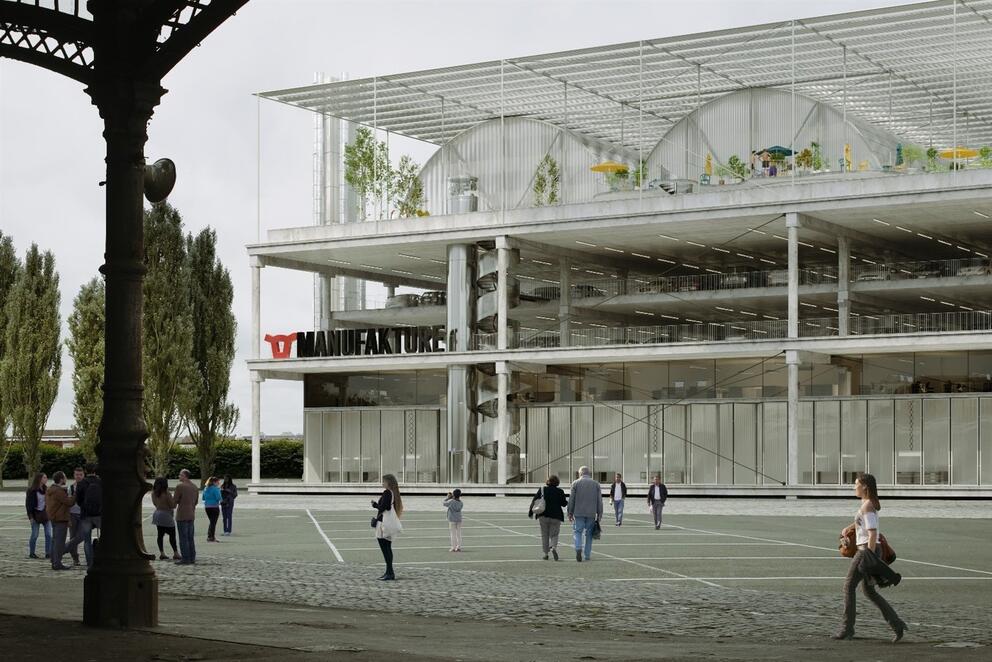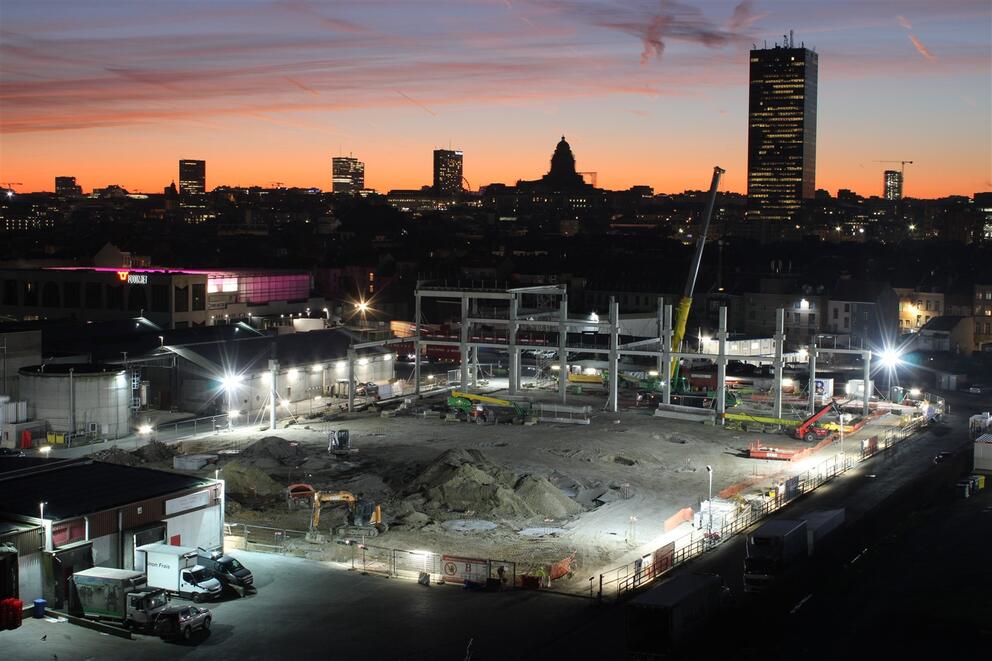Manufakture: a new phase in the development of the Slaughterhouses site
In March 2022, Minister-President Rudi Vervoort and Secretary of State Pascal Smet announced that the Government of the Brussels-Capital Region was giving the go-ahead in principle for the development of a public building programme on the site of the Anderlecht Slaughterhouses. This was followed by the purchase of most of the site by the Urban Development Corporation (SAU), which is responsible for coordinating its development in order to realise the Region’s ambitions.
At noon today, Mr Vervoort and Mr Smet took stock of these ambitions together with the mayor of Anderlecht, Fabrice Cumps, the director of the SAU, Gilles Delforge, and Elke Tiebout, the CEO of Abattoir S.A., the private concession-holder that operates the site. The municipality still owns the large historic hall and Abattoir S.A. remains the owner of a plot of land on Chaussée de Mons, on which FoodMet is located. Abattoir S.A. also holds a long-term lease which has been extended until 2088, which will allow it to develop its economic activities on the site.
As Brussels Minister-President Rudi Vervoort pointed out, ‘Because of its history, its location and its size, the Slaughterhouses site is of great importance for the Region. Extending over 10 hectares, it is strategically positioned close to two metro stations and the Canal and not far from the Gare du Midi railway station. The Region’s ambition is to open up the site and make it more accessible to the people of Brussels, and to enhance its utility to the city in particular by building public housing there, as part of a mixed programme that combines the past and future economic developments of Abattoir S.A. Now that the Region has improved public land control in this strategic location through the SAU, it will work to achieve its ambitions in terms of the creation of housing (around 200 homes in the first phase) and public facilities (around 5,000 to 6,000 m2), including a public swimming pool with an outdoor pool; the development of public and green spaces (approximately 2 ha); the maintenance of urban production activities; ensuring access for disabled users; and meeting environmental and climate goals. The Brussels Region will also make a significant contribution to the project for the renovation of the Central Hall, an exceptional part of the industrial heritage, of which the municipality remains the owner and Abattoir S.A. remains the lease-holder. The SAU has been tasked with coordinating the development of the entire site.’ This ambition of the Region had already been set out in the Regional Sustainable Development Plan, the Canal Plan and Urban Regeneration Contract 3 (CRU 3).
Secretary of State Pascal Smet explained: ‘This is a very important step on the way to Brussels’ first open-air swimming pool. The project was long dismissed as unrealistic, but today we are making it a reality. Everyone will be able to go swimming there while enjoying a fine view of Brussels.’
The mayor of Anderlecht, Fabrice Cumps, also took part in the visit accompanied by the media. He commented: ‘The start of the Manufakture project marks the vital starting point of a new phase in a process of rehabilitation of the strategic slaughterhouses area. The Municipality is fully committed to this process, which will involve public services alongside private economic players, and in particular Abattoir S.A. We are working together to make the site answer more closely to the contemporary needs of the Brussels food trade. But on this same site we are also beginning to build nothing less than a brand-new district, centred around the historic halls and closely connected to the existing urban fabric. All this will help improve the living environment for everyone who lives in this part of Cureghem. So today is a very big moment for Anderlecht.’
Elke Tiebout, CEO of Abattoir S.A., welcomed the regional and municipal authorities to the Slaughterhouses site for the event organised to mark the official launch of construction work on the Manufakture building.
Extensive work on the foundations has already been done since last May, but it is now possible to appreciate what the future building will really be like. Abattoir S.A. wants to take a further step towards the accomplishment of its master plan by building Manufakture. After the FoodMet (the food hall that opened in 2015), Manufakture will be the second urban project on the site intended for companies in the agri-food sector. Manufakture will be used for one of the site’s main historical activities: meat-cutting. Organising meat-cutting in the centre of a major European city is more or less unparalleled. The proximity and multicultural character of the customers and the diversity of the meat-cutters mean that the presence of a meat production activity in the centre of Brussels continues to make sense. In addition, Manufakture will serve production and processing companies in the food industry more broadly. This is a project with an area of approximately 6,000 m². The total cost of building Manufakture is 22.7 million euros. The ERDF and the Brussels Region are providing 10.1 million euros of funding for the creation of infrastructure for SMEs in the Canal Area. In addition, the Region together with the VGC (Flemish Community Commission) is investing a further 3.9 million euros in the reinforcement of the building so that a public swimming pool can be built on the roof of Manufakture. In the Abattoir S.A. master plan, the idea has always been to make good use of the rooftops of the city’s new buildings. ‘Abattoir looks to the future with optimism,’ explained Elke Tiebout. ‘With the construction of the Manufakture, we aim to continue our commitment to diversified economic development in the agri-food sector, in order to remain the “Belly of Brussels”. Together with many others, Abattoir S.A. wants to write another chapter in a long-running story, and to be an open site.’ A car park will also be created in the Manufakture building, with a total of 350 parking spaces spread over two floors.
Gilles Delforge, the director of the Urban Development Corporation (SAU), expressed his delight: ‘The perpetuation of public land control over the site at regional level has been ensured. The SAU will of course coordinate its development in consultation with the municipality of Anderlecht, the site’s historical owner, and with Abattoir S.A, its economic operator. The Region, the municipality and the operator have shared converging ambitions regarding its development for the past ten years. However, a new approach to land ownership and additional expertise were necessary in order to oversee the achievement of these ambitions and steer some of them. The SAU has been active in the Canal Area since 2016, so it has established excellent contacts with both the municipal authorities and Abattoir S.A. It also has experience in the development of major urban projects and a great variety of regional facilities. The SAU therefore proposed to acquire most of the site and take on the role of coordinating its development, including creating public housing and a swimming pool and improving and opening up the public spaces. A consensus over this was very quickly reached between the partners. After the agreements in principle had been reached between the different parties over the months, an important concrete step was taken on 24 March 2022, when Anderlecht municipal council approved the sale to the SAU of the part of the site owned by the municipality, except for the slaughterhouses’ large historic hall, of which Anderlecht remains the owner. In addition, Abattoir S.A. transferred to the SAU ownership of land by the Canal where the construction of public housing and other public programmes are planned, as well as the development of an esplanade between the Delacroix metro station and the Erasmus Hogeschool. Abattoir S.A. remains the owner of a plot of land on Chaussée de Mons, on which FoodMet is located. The company has also had its long-term lease extended until 2088, allowing it to develop in a high-quality its economic activities on the slaughterhouses site and reinforce this industrial and commercial agri-food centre. The SAU is currently working on coordinating the development of the various regional projects and has been tasked with delegated project management for the construction of the swimming pool.’
Frédéric Loriaux, Managing Director of CIT Blaton, the general contractor that is constructing Manufakture for Abattoir S.A., said: ‘CIT Blaton is very proud to be taking part in the revival of the Anderlecht Slaughterhouses site. The construction of this multipurpose building is in keeping with this fast-changing multicultural district.’



